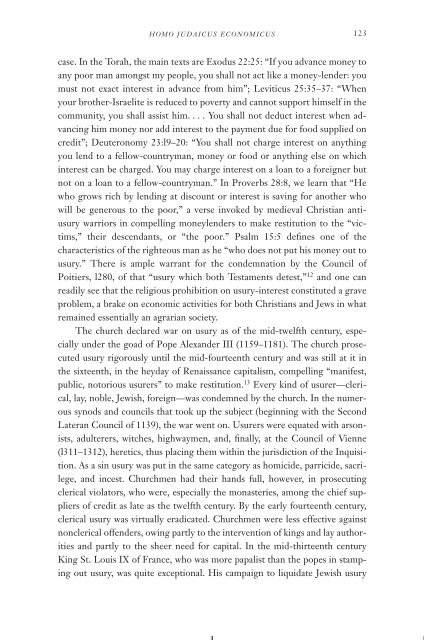41845358-Antisemitism
41845358-Antisemitism
41845358-Antisemitism
Create successful ePaper yourself
Turn your PDF publications into a flip-book with our unique Google optimized e-Paper software.
HOMO JUDAICUS ECONOMICUS<br />
123<br />
case. In the Torah, the main texts are Exodus 22:25: “If you advance money to<br />
any poor man amongst my people, you shall not act like a money-lender: you<br />
must not exact interest in advance from him”; Leviticus 25:35–37: “When<br />
your brother-Israelite is reduced to poverty and cannot support himself in the<br />
community, you shall assist him. ... You shall not deduct interest when advancing<br />
him money nor add interest to the payment due for food supplied on<br />
credit”; Deuteronomy 23:l9–20: “You shall not charge interest on anything<br />
you lend to a fellow-countryman, money or food or anything else on which<br />
interest can be charged. You may charge interest on a loan to a foreigner but<br />
not on a loan to a fellow-countryman.” In Proverbs 28:8, we learn that “He<br />
who grows rich by lending at discount or interest is saving for another who<br />
will be generous to the poor,” a verse invoked by medieval Christian antiusury<br />
warriors in compelling moneylenders to make restitution to the “victims,”<br />
their descendants, or “the poor.” Psalm 15:5 defines one of the<br />
characteristics of the righteous man as he “who does not put his money out to<br />
usury.” There is ample warrant for the condemnation by the Council of<br />
Poitiers, l280, of that “usury which both Testaments detest,” 12 and one can<br />
readily see that the religious prohibition on usury-interest constituted a grave<br />
problem, a brake on economic activities for both Christians and Jews in what<br />
remained essentially an agrarian society.<br />
The church declared war on usury as of the mid-twelfth century, especially<br />
under the goad of Pope Alexander III (1159–1181). The church prosecuted<br />
usury rigorously until the mid-fourteenth century and was still at it in<br />
the sixteenth, in the heyday of Renaissance capitalism, compelling “manifest,<br />
public, notorious usurers” to make restitution. 13 Every kind of usurer—clerical,<br />
lay, noble, Jewish, foreign—was condemned by the church. In the numerous<br />
synods and councils that took up the subject (beginning with the Second<br />
Lateran Council of 1139), the war went on. Usurers were equated with arsonists,<br />
adulterers, witches, highwaymen, and, finally, at the Council of Vienne<br />
(l311–1312), heretics, thus placing them within the jurisdiction of the Inquisition.<br />
As a sin usury was put in the same category as homicide, parricide, sacrilege,<br />
and incest. Churchmen had their hands full, however, in prosecuting<br />
clerical violators, who were, especially the monasteries, among the chief suppliers<br />
of credit as late as the twelfth century. By the early fourteenth century,<br />
clerical usury was virtually eradicated. Churchmen were less effective against<br />
nonclerical offenders, owing partly to the intervention of kings and lay authorities<br />
and partly to the sheer need for capital. In the mid-thirteenth century<br />
King St. Louis IX of France, who was more papalist than the popes in stamping<br />
out usury, was quite exceptional. His campaign to liquidate Jewish usury


